Strengths and weaknesses of Manchester United in 2012/13
This season Manchester United seems to lack the defensive strengths they had in previous seasons. Yet, this is not only because of the worrying injury record of their defenders or the lack of dynamic in the midfield department. The red devils’ defensive liability stems from tactical insecurities of the collective caused by slight changes in their philosophy and also some individual tactical problems.
The defensive problems start in unused spaces
Many fans argue that individual errors, lack of defensive skills (mostly Paul Scholes), and athleticism (both, Paul Scholes and Michael Carrick) are mainly responsible for United’s relatively poor defensive record. They have conceded 17 Premier League goals this season, more than any other top six team. In fact, only eight teams have fared worse.
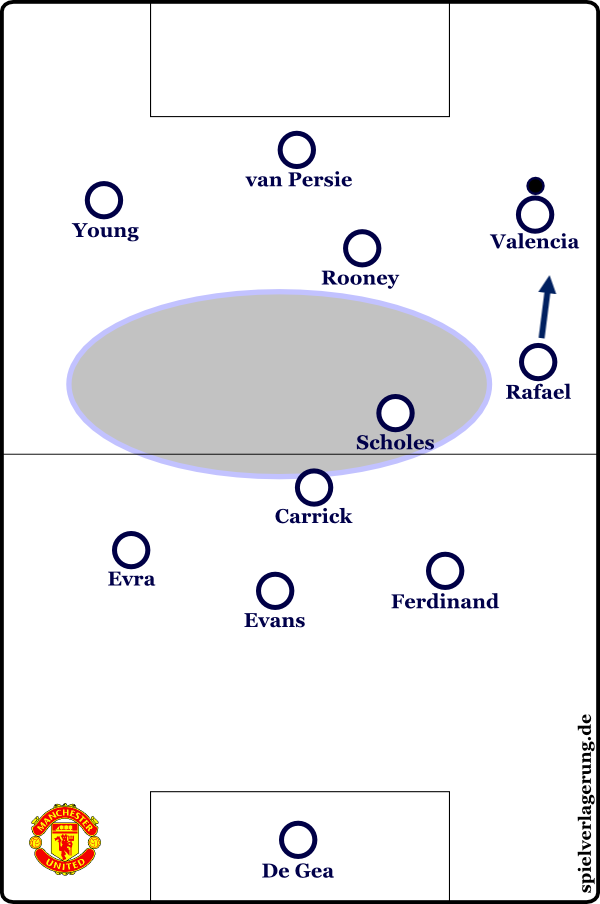
ManUtd attacks on the right side, but the defense stays deeper than they perhaps should, which opens up space for possible counters
Yet on the other hand both central midfielders do have many abilities in the defensive part of their game. Scholes is an extremely intelligent player with good positioning, an area where Carrick also excels. So their lack of dynamic is not the only reason for United’s problems, there are also tactical issues.
Most of the goals they concede come from long balls and attacks from the break – sometimes fast combination plays, sometimes with runs from one player through the second third of the pitch. Because of the huge space between central midfield and the attacking department there is a major gap in their formation.
Of course this is not something that can be changed within days. First of all, it should be said that Sir Alex Ferguson is not an idiot; he has reasons for this tactical deployment. He tries to bring passing accuracy and with Scholes a potentially decisive spark of creativity into the team but he knows that both Scholes and Carrick are not the ideal players for protecting the back four.
Therein lies another problem: the back four is probably the best in the league individually but they (just like Scholes and Carrick) do lack the needed speed for a higher backline. Their strengths lie in direct confrontation with the opposing attacker, intelligent positional play in restricted areas and collective coordination around the box.
With a higher backline they could make their pressing more effective but it would also expose a major weakness of the back four: covering bigger zones in high tempo (which is probably the main reason why André Villas-Boas failed at Chelsea). So Ferguson’s approach is to create a more compact defense with deep-lying midfielders who try to create numeric advantage in the first third of the field.
Yet with the huge space in midfield and attacking full-backs there is room for fast breaks and diagonal attacks. There are gaps to exploit on the flanks and in there’s time enough to plan an attack in midfield due to lack of immediate pressure. But Ferguson is trying to use different formations, an interesting player deployment in his classic formation and of course a more intensive counter-pressing to neutralize the weaknesses in this playing style.
Counter-pressing, Rooney and Kagawa
One main tactical aspect Ferguson has changed is United’s play against the ball and pressure against the oppositional build-up-play. While the offensive players press, the backline does not push up as high as in most high-pressing teams, for instance the FC Barcelona.
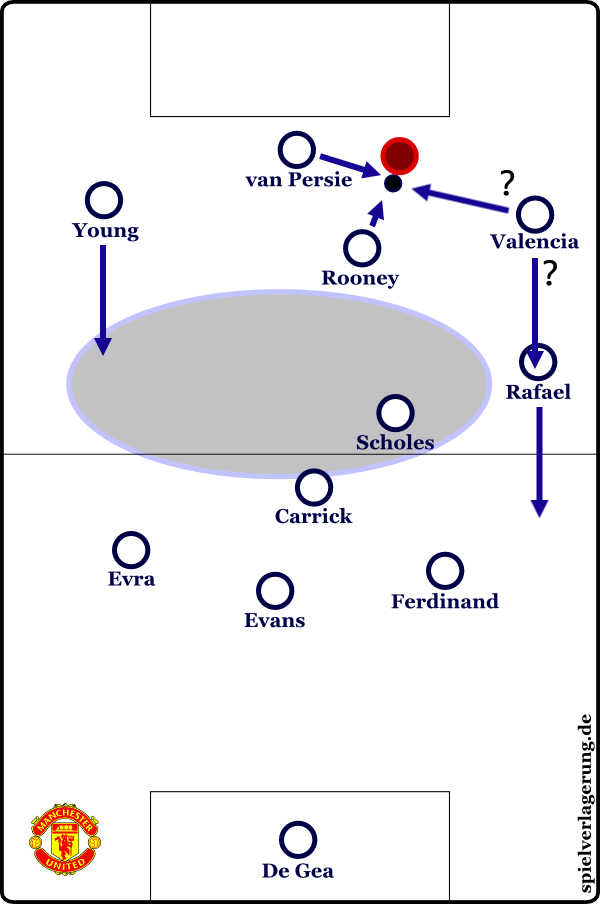
the ball is lost, the opponent has the ball. Rooney and van Persie immediately pressure him, depending on the situation also Valencia does
That’s why United does not possess extreme offensive compactness but Ferguson has ordered his players to be flexible when going back to their deeper positions in the basic 4-4-1-1 formation. They press backwards and put constant pressure on the opponent, just like they do immediately after conceding possession.
After losing the ball the nearest players attack the ball-carrying opponent and try to steal it back or at least destroy a possible counter. Dortmund under Jürgen Klopp and Barcelona since Pep Guardiola have the same principles but for other reasons: Klopp and his players want to be able to continue their attack while Barcelona are compensating for their high fluidity and extraordinary collective pushing up into the opposition half.
United still does not seem to have the ideal players for this pressing philosophy. But they are heading into the right direction with the deployment of Rooney as defense-supporting forward behind main striker Robin van Persie. Also the purchase of Shinji Kagawa, probably one of the best pressure-creating players in the world, could lead to a new era at United. With high pressing, the individual quality and athleticism of the players on the wing and the intelligent Rooney and/or Kagawa, they should be able to utilize their players in the best possible way.
Another plus is that they are able to change between 4-2-3-1 with one of them in the hole for higher midfield compactness, a 4-4-2-pressing-formation to block the passing options into the middle or a transforming mix of the two – the same tactics at which Kagawa excelled in Dortmund. A diamond shape was also successfully employed and could be installed long term but there is a slight problem with the new and sporadically tried defensive philosophy and United’s tactical history.
Could the trademark wingers become obsolete?
The answer to this question is probably a „no“, but with one of Kagawa or Rooney maybe pushed out on the wing and the (relatively) streaks of bad form from Nani and Ashley Young it is not as far-fetched as it may seem.
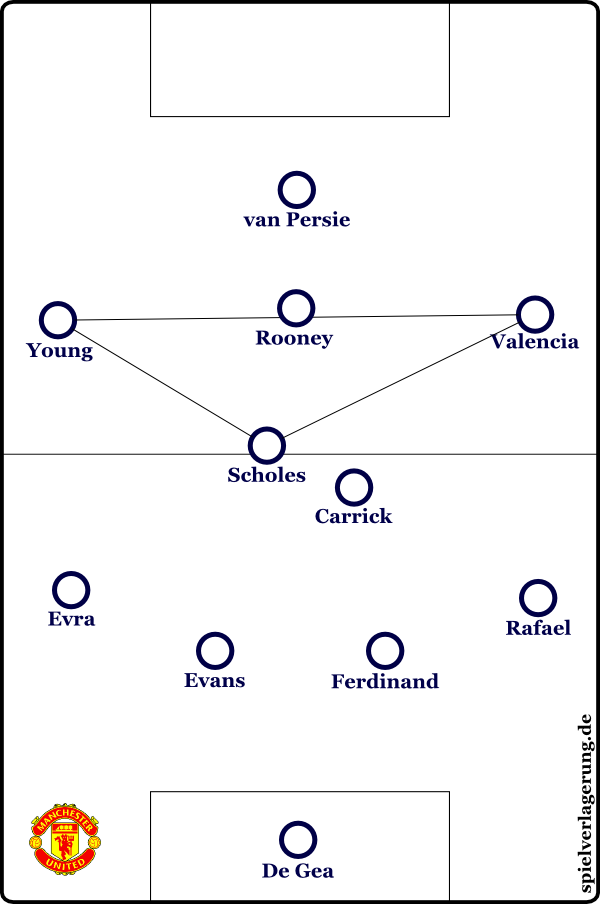
as we see the distances between the players are quite high. Fast combination are not possible, thus the movement of United’s collective becomes slow
The negative aspect in the 4-2-2-2-formation is that the wingers are standing too far out wide. They may stretch the play but at the same time they create a slow-passing momentum in their offensive play due to the long distances between the players.
Often attacks start in the very same manner: Scholes moves intelligently, gets the ball, maybe plays a one-two and then plays highly accurate long-balls out to the wingers. This was an exquisite tactic years ago, because the opponents weren’t standing as deep, often played without intelligent zonal-marking and with “space-shortage”, as Arrigo Sacchi would call it.
So there was more space and United not only relied more on the break but also succeeded more often. Now the ball comes to the wings, they need to take their time to control the ball and are already surrounded by two opponents. The opposing defense then blocks the diagonal passing option into the dangerous area and the way to the goal. The wingers have to go vertical and hug the line (and those runs result in difficult flanks) or they have to pass the ball backwards in order not to lose it.
This vicious cycle of slow attacks repeats, just like Barcelona, but there is no Iniesta or Messi to take the ball higher, so there is less acquisition of space. The good thing is that Paul Scholes is a genius and sometimes can find space even in the most compact formations and of course that Sir Alex is a wonderful manager with highly skilled players.
His players upfront can create something out of nothing, use errors of their opponents effectively or link-up with one another. Also they have players with various styles and qualities on the bench which gives them the possibility to change according to the context of the game or the opponent.
Kagawa, Rooney, van Persie, Hernandez, Young, Nani, Valencia…
Even in their 4-4-1-1 they are able to vary their style without major changes in formation. With Javier “Chicharito” Hernandez they have a “super sub” on the bench who can destroy teams on his own without doing anything spectacular. His secret is his movement. There are not many players who are able to open up room or drag oppositional players into the wrong space like he does.
His style is different to van Persie – who himself is not a classical poacher but can play this way. He was firstly a winger, later he played as a moving no.9 and is able to play as a traditional no.9. The same is true of Rooney though he is not as clinical as the Dutch. He even may not have a wider array of skills but his range is bigger, he is able to constantly change positions and also belong to different parts of the formation in the game.
Kagawa is a player in the same mould but preferably used in tighter spaces and between the lines. Although he hasn’t been in the same form he has been for Dortmund, he has shown glimpses of his quality frequently. To further his evolution he needs practice at his favorite position because he lives from collective understanding of movements and linking up with other players or between parts of the formation.
Similar variety exists not only in the front two positions of the 4-4-1-1, but also on the wings. Valencia is more of a vertical runner, beats players with his power and speed while Nani uses his flair and dribbling skills. In the same way he is much more vertical and is ideally played as an inverse winger even though he sometimes has to take other playing styles because of the team philosophy.
Young on the other hand is slightly more of a creative player from the side but also sometimes best played as a traditional winger. Maybe this mixture and the inconsistency is one of the reasons he started so good and later declined in the red shirt.
Anderson & Cleverley?
Thanks to Ferguson’s man management and intelligent transfers there is the possibility to rotate also on other positions. With Anderson and Cleverley there are in fact two quite dynamic central midfielders who have already played together very well.
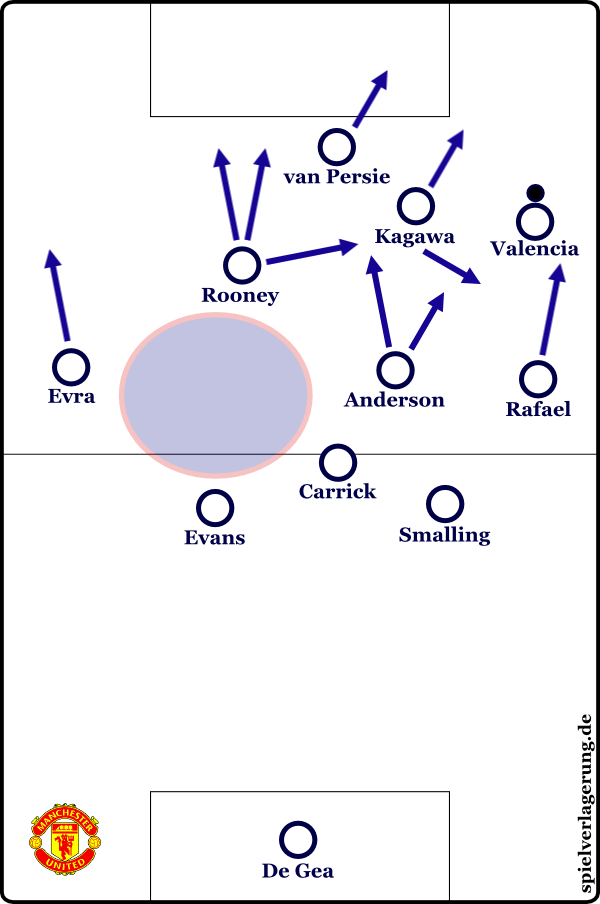
same situation as in the first graphic, but with another playing style and line-up. They may not have as much width as they use to, but the space for counters is smaller and there are much more passing options
But while they are faster than the Scholes-Carrick-partnership they also have their defensive weaknesses. Their positional play in the defense is not as consistent and disciplined as is Scholes’s or Carrick’s, who is probably the best in this department. Ferguson tried to use one of the younger ones (preferably Cleverley) with one of the elder (Carrick, because of his enormous defensive abilities).
He also wanted to install Giggs as a mixture between a positional disciplined midfielder and a creative force but this experiment failed due to the lack of awareness and too much vertical play (I really like the term “Hollywood passes”) into the attacking third of the Welsh.
So time is on the side of Anderson and Cleverley; and not only that. Both of them could – with some experience – become tremendous players, together with the new generation of defenders it even may be possible to play with a high backline and compensate for the defensive weaknesses of Anderson and Cleverley.
Conclusion
On the one hand, Manchester United is one of the best teams in Europe, with extraordinary players and one of the best managers in the game, Sir Alex Ferguson. On the other hand, there are many smaller tactical problems, caused by the wrong combination of players in different areas of the pitch. Especially the older players are used to another branch of football, they played a different style against different opponents with different defensive and offensive responsibilities; some of them are not able to push up as high as they used to do anymore, because they are not fast and skilled enough in their backwards-pressing.
Yet, Ferguson tries to alter his players for the better and so United is going through a phase of transition.
There are still some other tactical aspects which need adjustment (for instance the highly opponent-orientated zonal-marking), but the main problems are highlighted in this article. Still, the results this team achieves are exceptional, considering the problems it has, the opponents it faces and the injuries it has to suffer.
And with so many talents on the bench and coming through the youth ranks change and eventually titles will come. But in order to gain titles this season, the tactical issues should be sorted out within the next months, which is possible, because not only time is relative, space is also.
Ein sehr großes Danke an Markus Rill, der einen Großteil dieses Artikels lektoriert und korrigiert hat!
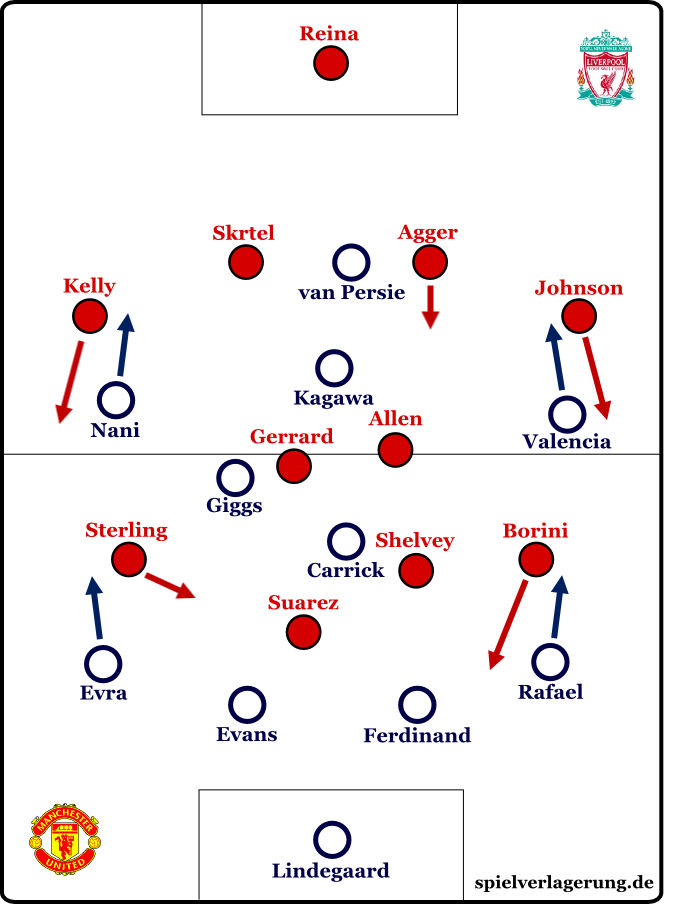
34 Kommentare Alle anzeigen
mare February 21, 2013 um 2:25 am
Der Artikel hat’s doch immerhin auch schon ins United-Forum “Red Café” geschafft, scheint aber viele der UserInnen dort schon aufgrund der schieren, ungewohnten Länge abgeschreckt zu haben, denn das Feedback ist bisher zwar durchweg positiv, aber eher mager im Umfang.
Wer “authentische” Einblicke in die englische Fußballseelenlandschaft gewinnen möchte, melde sich dort spaßeshalber an. it’s hilarious.
http://www.redcafe.net
Batuhan November 28, 2012 um 10:09 pm
Könntet ihr sowas auch für andere englische Mannschaften machen? Zum Beispiel für Arsenal würde mich sowas sehr interessieren. Spielerisch ist das ja bisher nicht wirklich überragend von ihnen, obwohl es vom Spielermaterial her ja schon für die Top-4 in England reichen sollte..
Würde mich da wirklich mal interessieren, woran das liegt. Hat ja auch sicherlich taktische Gründe.
Tank November 27, 2012 um 1:31 am
Finde ja, dass solche allgemeinen Mannschaftsanalysen mit klar gesetzten Schwerpunkten zu den ganz großen Highlights bei euch gehören. Das hat diese mal wieder bestätigt. Schön nachvollziehbare Punkte und ein gut zu lesendes Englisch.
Ob die United-Viererkette tatsächich die nominell beste der PL ist, wage ich aber zu bezweifeln. Die Citizens fand ich letzte Saison schon defensiv ziemlich gut besetzt.
Euer Lob an Paul Scholes bringt mich zum Lächeln. Er ist zwar im Zwielicht seiner Karriere, aber was für ein toller Spieler, der Ginger Ninja. Jedem der seine Klasse bezweifelt, seien nur mal die Zitate von Zidane, Xavi und Co. über ihn ans Herz gelegt. Neben Zanetti der beste Spieler der Welt über 35 würde ich sagen.
laterookie58 November 20, 2012 um 7:41 pm
@ RM : Möglich, daß mich die Jahre gelassener gemacht haben…
Ich kann sowohl die protestierenden alsauch die bejahenden Mitstreiter gut verstehen.
Wenn man von Euch “Schreiberlingen” auf derart hohem Niveau verwöhnt wird, muß man nach Euren Analysen süchtig werden! Und ist auf Entzug, wenn mal nichts zum Lesen da ist.
Nun ist zwar etwas da, aber nicht wirklich für Jeden von uns einfach zu konsumieren– auch wenn man Taktik- Experte ist…
Ich finde den Versuch toll; finde, daß er mehr als nur gelungen ist. Im anderen Bereich zwar, aber ich habe mich auch mit technischem Englisch in meinem Arbeits- Bereich drei Jahre lang rum geschlagen.
Hohe Konzentration, sein Fachwissen in die Fremdsprache zu bringen und noch vielmehr Zeit– und wenn man Glück hat, einen guten Lektor!
Ich danke Dir sehr herzlich für diesen Aufwand und für diesen “Versuchs- Ballon”, den Du uns geschenkt hast.
Viele meiner Mitstreiter haben es erwähnt und Du wohl– nach Lesen unserer Reaktionen– auch schon im Hinterkopf: wenn Deine/ Eure Zeit es überhaupt noch erlaubt, dann wären BL, 2.BL, Spiele CL und EL schon etwas Feines.
Und sicher auch bei vorhandener ausländischer Leserschaft etwas Besonderes!
Great idea and a brilliant job you did there! Thanks a lot. Take care, laterookie58
MyNameIsMud November 20, 2012 um 3:41 pm
Mal zum Inhalt :).
#Scholes & Giggs – Auch vor diesem Artikel fand ich es ja immer sehr interessant, dass man mit Scholes und Giggs zwei fast schon 40-jährige aufgestellt hat. Was mich persönlich aber immer wieder zu der Frage gebracht hat, ob dies wirklich für die Klasse der beiden spricht, dass sie in dieser Liga noch bei einem der besten Vereine zum Stamm gehören oder es nicht viel mehr gegen die PL spricht, dass die beiden Spieler nicht aus dem Stamm verschwinden.
Den Punkt mit Scholes fängt der Artikel ja auch auf. Anders herum gefragt.. warum investiert man wieder Mio. € in die Offensive (RvP, Kagawa, Henríquez) und holt sich für das Zentrum nicht einen oder zwei Spieler, damit die Probleme gelöst werden. Oder warum hat man es verpasst die alten Spieler früher zu ersetzen/abzulösen?
Und etwas weiter gedacht/(wieder anders gefragt) – unter der Berücksichtigung, dass ich in der PL nur vier bis fünf Vereine intensiver verfolgen kann – sind die Vereine aus der PL taktisch nicht aggressiv genug, wenn sie gegen z. B. ManU spielen und die Abwehr mit Pressing entsprechend ärgern? Es ist ja relativ auffällig, dass ManU (und auch City) oft einen Rückstand erst kurz vor Schluss noch drehen können. In der Häufigkeit finde ich das bemerkenswert. Dabei fällt mir oft auf, dass die kleinen Vereine sich wirklich weit zurück ziehen und fast nie Pressing spielen. Bei Konter mit zwei oder drei Mann angreifen und dann hoffen, dass man vielleicht das Ding irgendwie in den Kasten bekommt.
Ich denke, dass es ein gewisses Grundproblem gibt, wenn kleinere Vereine gegen Vereine spielen, die sich zum großen Teil durch starke Einzelspieler definieren. Oft lassen die kleine Vereine den Spielern Raum und Zeit und ziehen sich zurück. Bloß dann kommt halt die individuelle Klasse viel stärker zum tragen. Genau dies sehe ich bei vielen Vereinen als Fehler an. Eine gute Kombination aus früheren stören und kompakt stehen halte ich für besser geeignet. Aber dies führt vom Thema ab 😉
Dan November 20, 2012 um 11:12 am
auf Englisch also!?
ich fordere Artikel zur Primera Division auf Spanisch und zur Serie A auf Italienisch. Ob es dann die anderen verstehen oder nicht, interessiert mich herzlich wenig 😉
Bayernspiele in Zukunft bitte zünftig und derb. Boarisch selbstverständlich, Preißen müssen das nicht lesen können XD
vittigo November 20, 2012 um 1:12 am
@JayM: bundesligafanatic.com ?
JayM November 19, 2012 um 11:56 pm
Good article and very well translated – kudos!
The bottom line, however, is what every one has said about ManU for years – many individual players are just not good enough to play for a club like United.
Some are of course very good prospects and hardly anyone is better at nurturing talent like Ferguson is, but I wonder whether it isn’t time to give up on Evans (like SAF did with Fabio prior to this season). Every time I see him play he is an error-prone liability. Rio has been beyond his best for years – and his positioning has always been awful (not only because of his lack of pace). Not sure whether Smalling and Jones will ever justify the hopes set in them (though maybe I’m a bit too pessimistic about the latter). Anderson is a good squad player who never came off and who should hardly be a starter against strong opposition. Scholesy & Giggs are still brilliant considering their age, but time is ticking. Evra is probably beyond his best, Rafael is hit and miss, though neither of them is actually bad. Carrick remains a mystery – he seems to be the glue that connects the lines and he is a very intelligent player but he seems to be overrun and outmuscled so easily. Nani – what a frustrating player to watch! The jury is still out on Young in my opinion, he was great last season but is awful this season.
As I said before, hardly anything new in what I wrote and I agree with CL87 (above) – what’s the point in talking about ManU in English on a German site when all this and more has been chewed up and spat out a million times before on English-speaking sites? English-language articles on the Bundesliga would make much more sense. Just look at the Guardian to see how many non-German speakers show an interest in the Bundesliga. 🙂
GoalImpact November 19, 2012 um 9:43 pm
Inspiriert von diesem Post, habe ich mal die Einschätzung des ManU-Kaders nach GoalImpact mit den Einschätzungen hier verglichen:
http://www.goalimpact.com/2012/11/analyse-des-kaders-von-manchester-united.html
Fazit ist, dass Anderson & Cleverley tatsächlich noch keinen besonders positiven Einfluss auf die Tordifferenz haben. Aber das kann sich ja noch entwickeln.
Muratti Blue November 19, 2012 um 8:41 pm
Macht weiter so. Wenn man ein Wort nicht versteht kann man es mit Google Translate übersetzen. Es gibt Menschen die Deutsch nicht verstehen möchten aber aber die Arbeit hier gern mal lesen.
CL87 November 19, 2012 um 8:10 pm
Ich finde die Idee, Artikel auf Englisch zu veröffentliche, grundsätzlich hervorragend.
Mir ist natürlich nicht klar ob das jetzt einfach nur mal ein Experiment war, allerdings denke ich (bei allem Respekt vor dem Inhalt) dass englische Abhandlungen über ManUtd nicht wirklich nötig sind, davon gibt es genug im Internet.
Wenn ihr hingegen gelegentlich mal eine englische Analyse zu einem Bundesliga-Spiel oder einer Partie der Nationalmannschaft liefern würdet würde das euerer Seite einen echten Mehrwert liefern und wäre sicher eine super Anlaufstelle für nicht-deutschsprachige Bundesligainteressierte.
Karsten November 19, 2012 um 6:29 pm
Warum auf englisch?